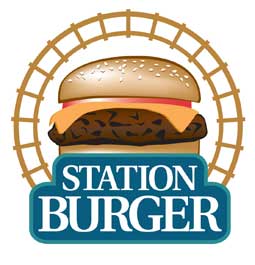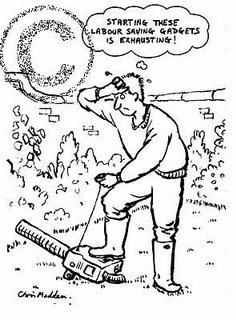
The other day I took my younger children to a Burguer King for lunch and there was a line of about a dozen cars at the drive-through window. Now, a drive-through window is not a window you drive through, but a window you drive up to and collect your food from, having placed your order over a speakerphone along the way; the idea es to provide quick takeaway food for those in a hurry.
We parked, went in, ordered and ate and came out again, all in about ten minutes. As we departed, I noticed that a white pickup truck that had been last in the queue when we arrived was still four or five cars back from collecting its food. It would have been much quicker if the driver had parked like us and gone in and got his food himself, but he would never have thought that way because the drive-through windows is supposed to be speedier and more convenient.
Americans have become so attached to the idea of convenience that they will put put with almost any inconvenience to achieve it. The things that are supposed to speed up and simplify our lives more often than not have the opposite effect and I started wondering why this should be.
Americans have always looked for ways to increase comfort. It is an interesting fact that nearly all the everyday inventions that take the difficulties out of life - escalators, automatic doors, passenger lifts, refrigerators, washing machines, frozen food, fast food - were invented in America, or at least first widely used here. Americanns grew so used to seeing a constant stream of labour-saving devices, in fact, that by the sixties they had come to expect machines to do almost everything for them.
The moment I first realized that this was not necessarily a good idea was at Christmas of 1961 or '62, when my father was given an electric carving knife. It was an early model and not as light as the ones you can buy today. Perhaps my memory is playing tricks on me, but I have a clear impression of him putting on goggles and heavy rubber gloves before plugging it in. What is certainly true is that when he sank it into the turkey it sent pieces flying everywhere and then the blade hit the plate with a shower of blue sparks and the whole thing flew out of his hands and shot across the table and out of the room, like a creature from a Gremlins movie.

My father was always buying gadgets that proved to be disastrous - clothes steamers that failed to take the wrinkles out of suits but caused wallpaper to fall off the walls in whole sheets, or an electric pencil sharpener that could consume an entire pencil (including the tips of your fingers if you weren't quick) in less than a second.
But all of this was nothing compared with the situation today. Amercians are now surrounded with items that do things for them to an almost absurd degree - automatic cat-food dispensers, refrigerators that make their own ice cubes, automatic car windows, disposable tootbrushes that come with their own ration of toohpaste. People are so addcited to convenience that they have become trapped in a vicious circle: the more labour-saving appliances they feel they need.
When we moved into our house in New Hampshire it was full of gadgets installed by earlier owners, all of them designed to make life a little easier. Most, however, were completely useless. Ono of our rooms, for instance, came equipped with automatic curtains. You flicked a switch on the wall and four pairs effortlessly opened or closed. That, at least, was the idea. In practice what happened was that one opened, one closed, one opened, and closed repeteadly and ond did nothing at all for five minutes and then started to produce smoke. We didn't go anywhere near then after the first week.
Automatic curtains, electric cat-food dispensers and clothes streamers only seem to make life easier. In fact, all they do is add expense and complication to your existence.
A text writed by Bill Bryson.
Take a look to some Houseworks myths.
3 comments:
I think there is a mistake in the sentence "The things that are supposed to speed up and simplify our lives more often than not have the opposite effect and I started wondering why this should be."
The 'not' there is unnecessary.
Also in the sentence above:"Americans have become so attached to the idea of convenience that they will put put with almost any inconvenience to achieve it." I believe it should be 'put up' and not 'put put'
Mr. Bryson,
Would you mind terribly if I paraphrased your experience with modern conveniences in a research paper? It is only for a college course and to be turned into a professor. I won't use your name if you so wish.
Sorry, my email is klrick3@uky.edu
Post a Comment